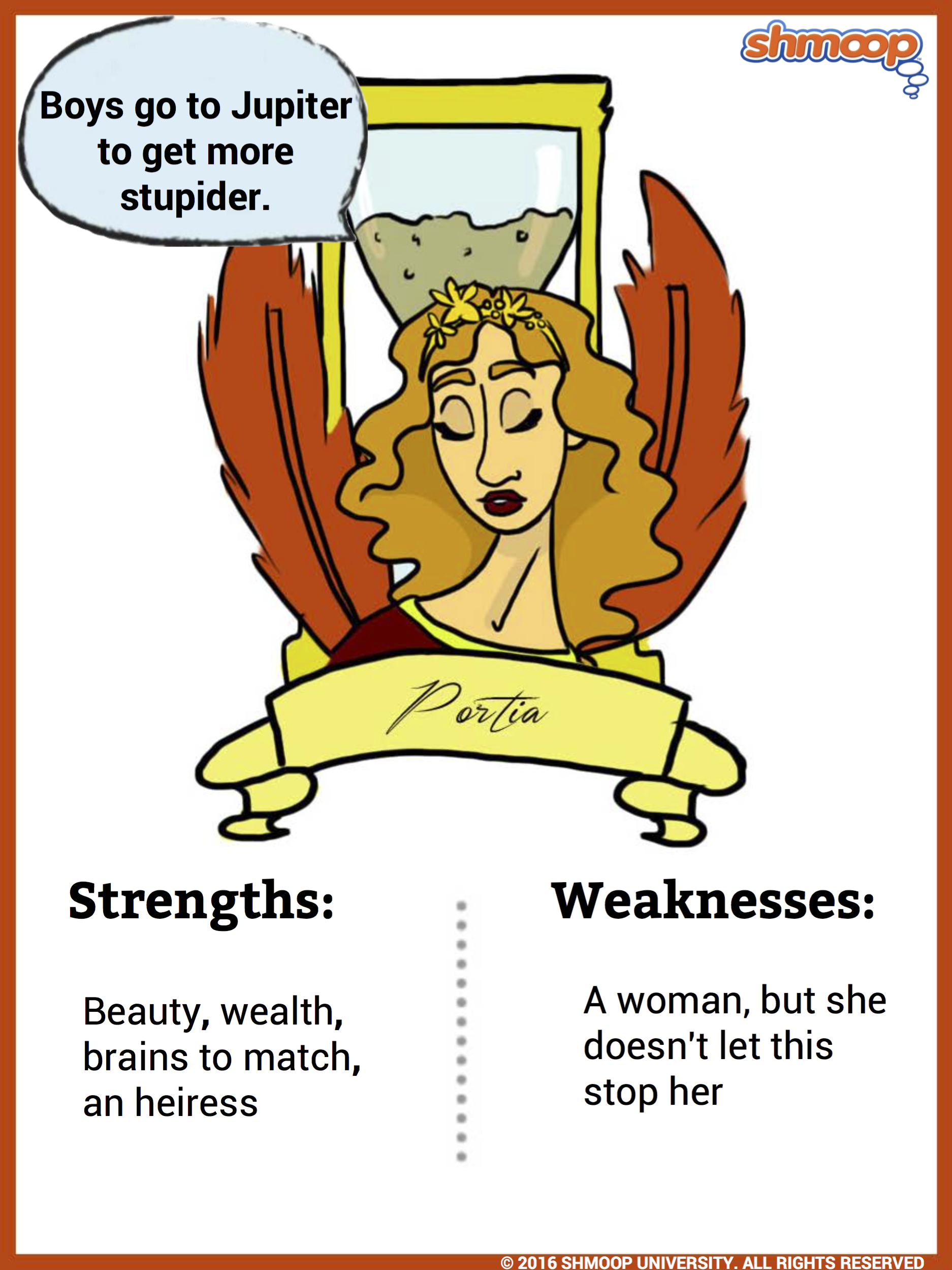Character Analysis

(Click the character infographic to download.)
Before we even meet Portia, we hear about how desirable she is: "In Belmont is a lady richly left, / And she is fair" (1.2.168-169). Translation: Portia is rich and hot, which makes her the most eligible bachelorette in Belmont.
The heiress to her dead father's fortune, Portia's wealth makes her a meal ticket in the eyes of Bassanio, who sees Portia as the answer to all his financial woes—if he can marry her that is. As Bassanio points out, he's not the only guy who'd like to land the heiress: "Nor is the wide world ignorant of her worth, / For the four winds blow in from every coast / Renownèd suitors" (1.2.174-176) willing to risk everything for a chance to marry Portia.
Gee, it sounds like Portia's got a perfect life, right? Not so fast.
Not only is every potential suitor out to get his hands on Portia's wealth, but Portia doesn't even get to choose her husband, because her (dead) dad set up a little contest ("lottery") involving three caskets to ensure his little princess married the "right" man. (If you need to brush up on the casket contest, go to the "Symbolism, Imagery, Allegory" section, but then come right back.) It turns out that Portia's dad knew how attractive Portia would be as a rich, single girl, so he did what any wealthy 16th-century Shakespearean father would and made sure his only daughter would marry the man of his choosing.
P.S. We've seen some pretty controlling fathers in Shakespeare's plays (Polonius and Baptista, we're talking about you) but this takes the cake, given that Portia's dad manipulates his daughter's marriage from beyond the grave.
As you can imagine, Portia is not happy about this at all and says as much to her BFF, Nerissa:
O me, the word "choose!" I
may neither choose who I would nor refuse who I
dislike. So is the will of a living daughter curbed by
the will of a dead father. Is it not hard, Nerissa, that
I cannot choose one, nor refuse none? (1.2.22-26)
Notice the repetition of the word "choose" in this passage? Portia's point is pretty clear—as "a living daughter curbed by the will of a dead father," she's still not independent of her dad's control—even if the guy's dead, Portia is still expected to obey his wishes.
But the thing to know about Portia is that she's not just a pretty face with a big bank account and a desire to obey her dead dad. As the play develops and we see Portia in action, it becomes pretty clear that our girl is both smart and cunning. Of course, you'll be wanting some evidence for this claim, so here it is.
1. Portia and the Casket Contest
Portia clearly wants to marry Bassanio. Yes, we realize this is an unfortunate choice given that Bassanio a) wants Portia's money and b) seems to value his bromance with Antonio more than his relationship with her. When Bassanio shows up to try his luck at the casket lottery, Portia has her band of personal musicians play a little tune (full of not-so-subtle hints) that helps Bassanio make the right choice (3.2.65-74). You can read more about this music business in "Symbolism."
2. Portia Saves Antonio's Life and Her Marriage
You remember how Portia cross-dresses as a lawyer and saves Antonio's life during the big trial scene, right? This means she not only was clever enough to save her man's BFF, but she also made it so that both men owe her big-time. The next time Bassanio and Antonio are thinking about spending the weekend playing Xbox together, they'll probably feel so guilty that Bassanio will decide to hang out with his wife in Belmont instead.
3. The Ring Trick
We saved the best evidence for last. After Bassanio snags Portia by winning the casket contest, Portia gives him a ring and makes him promise to never, ever part with it (3.2.176-178). Being Bassanio, he parts with the ring when Portia (disguised as Balthazar the lawyer) says something like, "Hey Bassanio, since I just saved your friend's life, how about you give me that ring you're wearing" (4.1).
Why does Portia do this? Because she knows that Bassanio will give up her ring, with all it symbolizes, as a gesture of thanks to the "man" who saved his beloved Antonio's life. (She knows exactly where Bassanio's loyalties are, and they're not with her.) When Portia later confronts Bassanio about losing her ring, he knows he's busted and feels guilty about betraying her. Like we said, Bassanio will think twice now about blowing off Portia to hang with Antonio.
So Portia is limited by her circumstances as a woman and has to obey her dad and navigate relationships with men (like Bassanio) who want her for her money. But she manages to play by society's rules (mostly) while having a lot of fun twisting said rules to her own advantage. In the end, Portia outsmarts everyone and winds up on top.
Portia's Timeline